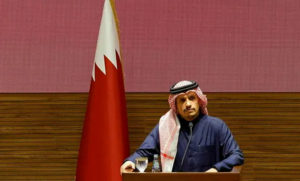How an Arab coalition can help save the Gaza ceasefire

Qatar’s Prime Minister Sheikh Al-Thani in Doha on 15 January 2025
Amir Tibon writes in Haaretz on 22 January 2025:
It’s been less than a week since the cease-fire between Israel and Hamas took hold and, for the first time in 15 months, the terrible anxiety that has hovered above this land since October 7, 2023, has partially receded. We don’t wake up every morning to new announcements of deaths and injuries, and there have been no bombs falling on Gaza or missiles launched at Tel Aviv. Israel had a moment of national elation when three hostages were returned alive to their families on Sunday; another group of four is supposed to be released on Saturday.
But the fear that has become like a shadow to so many hasn’t gone away. It’s still here. The sum of all fears right now – at least for the families of the hostages and the millions of Israelis anxiously awaiting their return – is that the precarious cease-fire will collapse, and the light at the end of the tunnel will go dark.
Dozens of hostages are still alive in Gaza, and more than 20 of them are bound to be released in the second phase of the deal. Yet there is growing concern that the cease-fire won’t last long enough for them to get out.
The families of the hostages are fighting for their lives, in Israel and in Washington, pushing for the deal to be implemented in full. This despite the threats of Benjamin Netanyahu’s far-right coalition partners to topple his government if he doesn’t renew the war by late February. Their best hope remains U.S. President Donald Trump and his special envoy to the Mideast Steve Witkoff. They are the ones who got Netanyahu to sign the deal in the first place, and their pressure is crucial to keep him committed to it.
But there’s another set of international actors that could impact the fate of the cease-fire and the hostages: the leaders of key Arab countries that have friendly relationships with Israel, among them Egypt, Qatar, the United Arab Emirates and Jordan. These countries all want the cease-fire to hold and the war to end, each for its own reasons.
Egypt because it borders Gaza and fears a spillover of desperate refugees into its own territory. Qatar is the country that, with Israeli authorization and encouragement, sent suitcases full of cash to Hamas for years, helping the organization turn into an army of terror. Helping finalize a cease-fire deal and saving the hostages is the country’s best way to erase the stain of October 7 from its global reputation.
An Egyptian soldier stands guard while trucks with aid cross into Gaza at the Rafah border crossing on Sunday.Credit: Khaled Desouki/AFP
Jordan, a country with a Palestinian majority ruled by a Bedouin dynasty, always seeks quiet and stability between Israel and the Palestinians – out of fear that turmoil on the other side of the Jordan River will destabilize its own citizenry. The UAE, for its part, seeks greater influence in the region and wants to prove itself a helpful partner to the Trump administration.
These countries, and others, should use the next days, ahead of Israel and Hamas’ entry into negotiations over the second phase of the cease-fire, to put forward a detailed plan for Gaza’s reconstruction on the day after the war. This plan should be generous and grandiose, and offer a new, better future for the people of Gaza.
Yet it should come with one important string attached: Its implementation would require Hamas to give civilian control of Gaza to a different Palestinian government – one endorsed by these Arab governments – and to serve as their credible partner in the reconstruction effort.
No country in the world, not even the historically pro-Hamas Qatar, will invest money in the reconstruction of Gaza now if it thinks another war, and further destruction, could arrive in a year or two. It would be akin to setting billions of dollars on fire. This is essentially what happened at the end of the 2014 Israel-Hamas war: Eventually, all the money invested in rebuilding Gaza from that disaster turned to rubble.
An Arab coalition offering reconstruction in return for Hamas’ relinquishing power isn’t only the sensible thing to do when looking at the future – it can also be the wild card in the fight to preserve the cease-fire.
Netanyahu has promised his far-right coalition partners to renew the war in order to eliminate Hamas. But if Trump and his team increase the pressure on him to continue with the cease-fire deal, he will have to find a way to save face and pretend he didn’t give in to pressure.
This is where a plan that gets Hamas to give up power could play a major role. Ron Dermer, Israel’s strategic affairs minister and the official closest to Netanyahu, hinted on Wednesday that a reconstruction plan supported by Arab countries was being drawn up. In a rare speech before the Knesset, Dermer said that any “day after” plan in Gaza would have to involve Arab partners.
The clock is ticking and time is running out – for the hostages and the cease-fire.
The time to present a credible plan that will be endorsed by key Arab countries, the Trump administration, European governments and international organizations is now. Such a plan would make it harder for Netanyahu to destroy the negotiations – and provide him with an exit ramp in case he needs to sell a “victory” to his coalition partners and explain why he isn’t renewing the war.
It won’t be the “total victory” he promised throughout 2024, but it could be just enough to save the cease-fire, the hostages and perhaps even his government.
This article is reproduced in its entirety
